|
ANTHONY WOODS
Courage and Conviction
by
Michael Bedwell
|
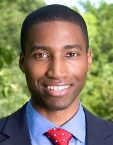 |
As
the year-end reviews of 2009 are being written, beyond
the mice of petty political scandals and the rats
manufacturing poisonous political polarization, despite
persistent economic motion sickness and another stomach
punch to LGBT equality in the form of the overturn via
public referendum of marriage equality previously passed
by Maine’s legislature, surprisingly, no less than the
extremely mainstream “men’s magazine” [read straight,
white, and rich-aspiring] Esquire took notice of
a 29-yr. old gay black man raised by a single mom too
poor to afford health insurance. Before they named their
annual “Sexiest Woman of the Year,” Esquire’s
“Candidate of the Year” is former US Army CPT. Anthony
Woods.
For
Woods, who prefers “Tony,” it was a challenging, at
times dangerous, and frequently courageous path to the
pages of the magazine that symbolizes so many things he
is not. The flatlands of Fairfield, California,
approximately 50 miles northeast of San Francisco, have
almost nothing in common with the desert of Tall ‘Afar,
Iraq, a mainly ethnic Turkmen city, located 260 miles
northwest of Baghdad in the province of Nineveh. There
are two things, however: Fairfield’s Travis Air Force
Base, which has supplied combat support for the war
effort throughout Iraq, and Woods.
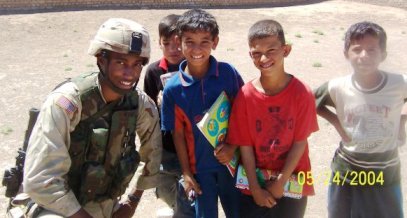
Woods' mother, like his father and Vietnam-veteran
grandfather, was in the Air Force and he was born at
Travis. He also served in the 2005 bloody battle for
Tall ‘Afar as a part of the 3rd Armored Calvary
Regiment, his second deployment to Iraq after previously
being assigned to Diyala province northeast of Baghdad.
The first resulted in his receiving an Army Commendation
Medal, and the second a Bronze Star for Service, but
he’s proudest of all of not losing anyone under his
command across days when, in his words,
“tedium and toil turned into chaos and tragedy. One
day in September of 2004, four of my soldiers would
tempt fate and survive. I watched in what felt like
slow motion as the blast of a roadside bomb engulfed
their vehicle. Later, I wondered if next time we’d
be so lucky.”
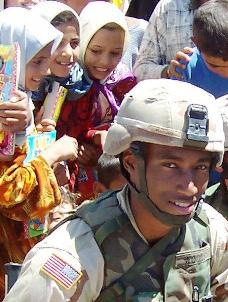 |
Leaving Tall ‘Afar unscathed was at least
the third time that Woods himself escaped
death, the first after complications with
his birth that, even if he survived, doctors
feared might cause cerebral palsy or brain
damage. He not only survived, but lettered
in football and track in high school, and
much has been written of his intellectual
gifts. As Esquire observed,
summarizing his mother’s feelings: “Every
accomplishment of his feels to her like the
beating of some cosmic odds.”
His service in Iraq followed his appointment
to and graduation from West Point with the
kind of education his family finances could
never have provided. The last to take
opportunity lightly, his gift for leadership
was recognized when he was made commander of
summer training for the 1200 yearling
[sophomore] class cadets, and he made the
Dean’s List for academic achievement. |
Since
Iraq, he’s repeatedly demonstrated his determination to
help others, particularly those affected by poverty,
including bicycling cross country to raise money for
Habit for Humanity and lending his own hands on three
trips to help rebuild Katrina-ravaged New Orleans. These
efforts won him the Robert F. Kennedy Public Service
Award.
He
also enrolled in the Masters Degree program at Harvard’s
Kennedy School of Government, with the help of a 50%
scholarship from the school and an equal amount from the
Army. He had already been accepted by West Point as an
instructor of economics post graduation. Again he
excelled and would eventually be one of the 2008
Commencement speakers.
|
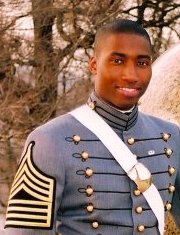 |
But
during his second year at Harvard, after years of having
attempted to repress his homosexuality, hoping, as so
many, that it would go away, the very source he had
looked to for help conversely resulted in his accepting
himself. As a Christian since he was 14, he had
discovered a group online that encouraged people to
believe in the power of prayer. However, when he learned
that they preached that “God does not listen to prayer
related to homosexuality,” he realized how inconsistent
that was with what he both believed and valued about his
faith. In turn, one of his professors mentored his
growing self-acceptance, and soon Woods, who’d served on
the Honor Committee at West Point, realized, much like
his Academy classmate LT. Dan Choi, that he could no
longer honorably serve in silence.
|
Though they’d never met, he informed his Army student
detachment commander in South Carolina, and she, as
procedure demanded, started a six-month investigation to
determine whether he was falsely making the claim just
to get out. They determined that he was telling the
truth, should be given an honorable discharge, but, oh,
by the way, you owe us $35,000 for your scholarship to
Harvard.
He
decided not to fight that, but his case did become
public, and, in the process, he learned that he did not
know at least one of his fellow soldiers as well as he
thought.
Overall, he recalls no significant homophobia during his
five years in the Army. In fact, there was one guy in
his unit who was “pretty much out,” and Woods saw no
evidence that anyone cared. In his own life, after
reaching the decision to be himself, he told most of his
friends, one-by-one, that he was gay but was unable to
connect directly with one of them before that person was
told by someone else. He’d given permission to tell, and
asked him to ask the third person to call him. He never
did. The next Woods knew someone he served with
side-by-side in Iraq was personally attacking him in
comments posted to the online version of an article in
Harvard Magazine, railing that Woods was not to
be trusted, was surely consciously and unfairly
exploiting the Army for a free education that someone
else [nongay] could have gotten, then abandoning his
responsibilities to the US Army. Of course, he insists,
he has nothing against gays.
No
one was more surprised than Woods. “I was the
replacement commander for this guy’s platoon. We ate
together in Iraq almost every day; hung out together
almost every day. I was a groomsman at his wedding! It
really took the wind out of my sails for awhile.”
Still, he’s convinced this is an exception, at least
among younger generations in the service.
“I
didn’t see anything that told me the military couldn’t
handle out gays. But some who’ve been in, say, fifteen
years or more are continually repackaging the excuses
why the ban can’t be lifted. When they say that they
can’t do it in time of war—I firmly believe that’s the
perfect time to do it because if someone’s about to
deploy they don’t give a crap whom someone else dates,
they’re distracted by more important things. I still
love the Army and would be happy to serve again if the
policy went away.”
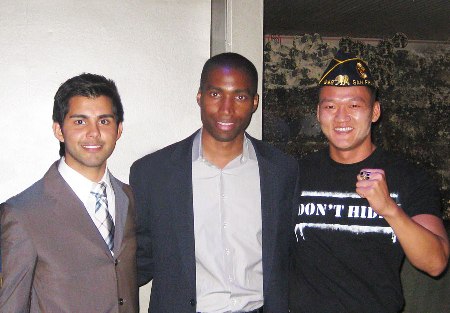
DADT Casualties Joseph Rocha, Anthony Woods & Dan Choi
The
irony of his mission in Tall ‘Afar being called
“Operation Restoring Rights” is not lost on this writer.
After
leaving the Army, and briefly working in the private
sector, a rare opportunity for greater public service
arose that Woods felt he couldn’t pass up, however small
the odds of success. The US Congresswoman representing
his own district, Ellen Tauscher, resigned to become
Undersecretary of State for Arms Control and
International Security. Even had she not
previously been the primary sponsor of the House bill to
repeal Don’t Ask, Don’t Tell, Woods would, no doubt,
have decided to run for the Democratic nomination to
replace her; such opportunities rarely come. The
surprising results were why Esquire came to name
an unknown running for office for the first time
“Candidate of the Year.”
Not
because he won, which he didn’t. But because in less
than four months, and up against no less than 13 other
candidates, including the Bill Clinton-endorsed Lt.
Governor, a household name after being in California
politics for 35 years, a Tauscher-endorsed state
senator, and an Emily’s List-endorsed, largely
self-funded state assemblywoman, political virgin Woods,
running not as the “gay candidate” nor the “black
candidate” but one who raised issues relevant to
everyone such as health insurance and how to merge the
goals of national service and educational opportunity
also raised an astounding $100,000 made up mostly of
small donations, and came in fourth among the Democrats,
earning nearly 9% of the vote.
And
he garnered what, as they say, money can’t buy: the
beginnings of national name recognition which neither
began nor ended with Esquire but within the pages
of the New York Times and the Washington Post,
and on CNN and programs such Real Time with Bill
Maher.
And,
he gained high praise from winner, and now Congressman,
John Garamendi: “I'm not the first person to say this
and I won't be the last: you have a bright future in
politics should you choose to pursue a political career.
You have an intelligence, grace, and resume that is
worthy of elected office.”
Until
that next opportunity comes along, that he may or may
not choose to pursue, Woods has returned to public
service in another way. He is the coalition director of
ServiceNation, the first campaign of non-profit Be the
Change, Inc., “to elevate community service as a core
ideal and problem-solving strategy for communities
across America. I will be helping to manage
ServiceNation’s 200 plus coalition member groups, and
directing its efforts to support the
Cities of Service program—which is building a
network of cities and helping their elected leaders
develop comprehensive service plans that empower more
citizens to get involved in their communities.”
Woods’ campaign slogan was “the courage of conviction.”
I would respectfully amend that to say that he has both
courage and conviction, and those characteristics,
separately and together, have already inspired countless
others to aspire to the same. We’ll likely never know
how many gays of color he’s touched as only the second
black gay servicemember in our history, following late
Army SGT. Perry Watkins, to achieve national attention
after willingly outing himself to fight the ban. Seeing
him among those four, diverse, proud gay veterans who
placed a wreath on the Tomb of the Unknown Soldier in
October made that historic event all the more memorable.
His personal initiative is all the more amazing for he
did it so soon after having finally accepted that fact
himself, striding little more than a year and a half
from telling a single person privately to telling
millions on television.
And,
now, as he focuses his time and talents on service to
all communities, I am reminded of a business-size card
some in Boston briefly distributed decades ago. It read,
“You have just been helped by a gay person.” It turned
the idea of the nongay world perceiving us only as a
community demanding something on its head, and is worth
being revisited. That is not to say that I agree with
those who suggest we must do anything in order to prove
that we “deserve” being granted first class citizenship
for I don’t. And I am confidant nothing he does is
intended that way. One need look no farther than the
content of his Harvard Commencement address to know that
his passion for combating poverty and injustice, for
feeding hungry mouths and minds, would persist
regardless, that it is as natural and necessary for his
being as breathing.
http://www.youtube.com/watch?v=sSf1cNqoCVs
Still, it is good to let our light shine, and none
shines brighter than Tony Woods as he becomes a leader
in another kind of volunteer army.
© 2009
Gay Military Signal |